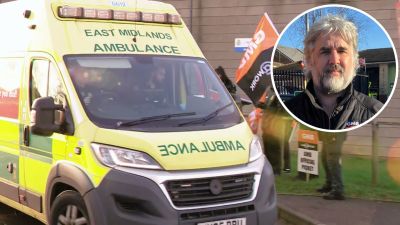Striking paramedic on picket line says he was once called out 'to turn patient's heating up'

A paramedic who was called out to turn someone's heating down says ambulance crews are being used as "the safety net of the NHS".
Emergency workers across England and Wales walked out on Wednesday for the second strike in a dispute over pay and working conditions.
Paul Bowman, a paramedic with the East Midlands Ambulance Service, said he had "never seen it this bad" in 22 years.
The GMB union rep joined the picket line in Corby, Northamptonshire, where he said the life-saving skills of highly trained staff were being wasted on inappropriate call-outs and sitting outside hospitals.
"I've been to a patient who asked me to turn their heating up for them," he said. "Those sorts of things really aren't an emergency for the ambulance service.
"They might be an emergency for the person themselves, but unfortunately we're not there to do that sort of thing."
Mr Bowman said issues elsewhere in the NHS had left paramedics picking up the pieces.
"We have become the safety net of the NHS," he said. "Anyone who can't deal with their patients is quite literally telling them to call 999 for an ambulance.
"We are having to deal with everything."
While a crew would usually be expected to attend between eight and 10 emergencies a day, Mr Bowman said he knew colleagues who had spent an entire shift sitting outside a hospital waiting to unload a patient because of handover delays.
"It's putting an extreme amount of pressure on staff. They are having to go from emergency to emergency all the time so they are not getting back for their meal breaks," he added.
The GMB and Unison unions said up to 25,000 ambulance workers were due to go on strike on Wednesday - with only the East of England Ambulance Service and the Isle of Wight NHS Trust not taking action.
GMB national secretary Rachel Harrison said talks with Health Secretary Steve Barclay earlier in the week "fell well short of anything substantial that could stop" the walk-outs.
"There was some engagement on pay - but not a concrete offer that could help resolve this dispute and making significant progress on the recruitment and retention crisis," she said.
NHS England has told patients to continue to call 999 for life-threatening emergencies but to use 111, GPs and pharmacies for non-urgent needs.
It said some people may be asked to make their own way to hospital, though it urged people to seek medical advice from 111 or 999 before doing so.
All category one emergency calls will be staffed by striking workers and most category two calls - such as chest pains and suspected strokes - should be too.
The health secretary acknowledged it was "appropriate that people have the right to strike" but criticised the ambulance unions for failing to set a national minimum level of service for the strike period.
He said "nothing was off the table" when it came to talks with unions but stressed that any resolution had to look "at what's affordable to the NHS and country as a whole".
Unions warned more strikes could take place if "meaningful talks" did not take place with the government soon.
Next week, members of the Royal College of Nursing are due to stage their second walk out at hospitals across England.
Want a quick and expert briefing on the biggest news stories? Listen to our latest podcasts to find out What You Need To Know